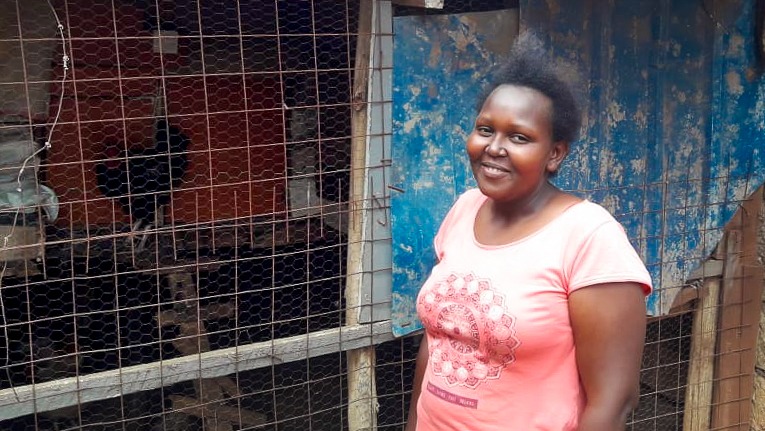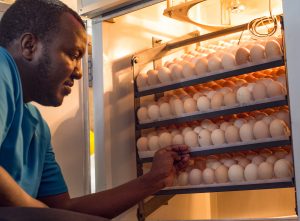
Lillian Mukami, a resident of Kula Mawe in Isiolo county, part of the arid and semi-arid lands region, has overcome indomitable odds in her 27 years. Death robbed her of an opportunity to get an education: “When my father and elder brother passed on, I did not have anyone to support me with my education. So, I dropped out in my second year of high school and started working in people’s farms to support my mother and my siblings,” Lillian said. A day’s wage would earn her between 300 and 500 KSh ($3-5).
In 2015, Lillian and other youth from her area formed the Wiumiririe Youth Group to support each other and seek ways to generate income. Soon, the group grew to 50 members and held meetings every Friday. At each meeting, members contribute 100 KSh ($1) to a communal pool with the idea of supporting each other. “One time my younger sister fell ill and since I did not have any money, I was able to get a loan from the group to take her to hospital,” Lilian explained.
Eventually, the group members decided to venture into rearing poultry as a way of increasing their savings. Although everyone was enthusiastic about this new endeavor, the excitement was short-lived. No one had prior knowledge of how to rear chickens and they did not know how to take proper care of them. As a result, many of the chickens died due to sickness, leading to heavy losses and low morale among the group members.
Transformation Through Training
However, their luck was about to change. In early 2019, the youth group’s chairwoman met with the Isiolo team of the USAID-funded Feed the Future Livestock Market Systems Activity (LMS) and the group’s transformation began. After hearing of their challenges, the LMS team enrolled them in a poultry and hatchery training under the Expanding Economic Opportunities Award, an associate award of LMS. The training is a component under the program that seeks to enable households to generate more income within the livestock sector and diversify their income sources. In doing so, households—with a focus on youth and women—build resilience and create sustained pathways out of poverty.
After attending several training sessions and applying what they had learned, the group noticed that their flock survival rate rose from 20 percent to 89 percent. Soon the group had many clients coming to buy their chickens.
“We learned quite a lot on poultry keeping and management, especially on the importance of maintaining cleanliness in the coop, how to administer medicine and also how to market and sell [the chickens].”
Lillian Mukami, Wiumiririe Youth Group member
Independence through Income Generation
After acquiring a 528-egg incubator, the group diversified from solely poultry rearing to hatchery production. Owning an incubator enables the group to manage the full cycle of the poultry process from laying to selling. “We would buy one egg at 25 KSh ($0.25) from a supplier in Nanyuki, and incubate it for 21 days. When the chicks hatched, we would sell day-old chicks for 100 KSh ($1) and month-old chicks for 250 KSh ($2.5),” Lillian stated. After deducting expenses, the group pooled the savings and continued to lend to each other.

Operators association, with incubator
As the flocks grew, the coops soon became too small and the chickens were divided among members to start rearing and selling on their own. “In October 2019, I received 15 chickens. This was a good thing because now I had another way of making money to support my mother, siblings, and young child. I planned to rear the chickens and then sell half and with proceeds from the sale, buy some more as well as direct some of the funds to household needs,” Lillian said.
Technology Promotes Market Linkages During COVID-19
In March 2020, the group faced its biggest hurdle yet: Kenya was put on lockdown to slow the spread of COVID-19, with heavy restrictions on movement. As a result, Lillian and other members of her group found themselves unable to secure work and saw the supply chain for their chicken business broken. “Due to the lockdown, our supplier stopped delivering eggs and we were faced with a serious shortage for our hatchery,” Lillian explained.
During this time, LMS stepped in to support the youth group and other poultry farmers in the area. First, a supplier based closer to Isiolo was identified and this eased access to much-needed eggs for hatchery farmers. Secondly, through the smart-phone communication application WhatsApp, LMS created a group to bring together poultry farmers, suppliers, feed producers, poultry veterinarians, and other specialists. This enabled the poultry farmers to source supplies, seek advice when they face problems with their flocks, and share knowledge safely.
This has revolutionized how young farmers like Lillian approach poultry rearing.
“Thanks to the new supplier and the WhatsApp group, I am now able to expand my own chicken business and support my family. During this period, I have been able to sell enough to not only pay my rent and buy food but also support my mother and siblings.”
LILLIAN MUKAMI, WIUMIRIRIE YOUTH GROUP member
Lillian and her fellow Wiumiririe Youth Group members have trained 37 youths in the area, allowing them to become self-reliant. “I want to now dedicate all my energies to this so that even after the pandemic, I will be a self-employed poultry farmer,” Lillian said.
The hatchery operators that are part of the WhatsApp group have also expanded operations beyond the initial informal virtual platform and recently registered with the Isiolo County Government Social Service as Isiolo Hatchery Operators. The group of 72 members has a combined egg capacity of 2,922 eggs and they have already supplied over 1,000 eggs to Isiolo and Marsabit counties.
Learn more about our efforts in Kenya here.








